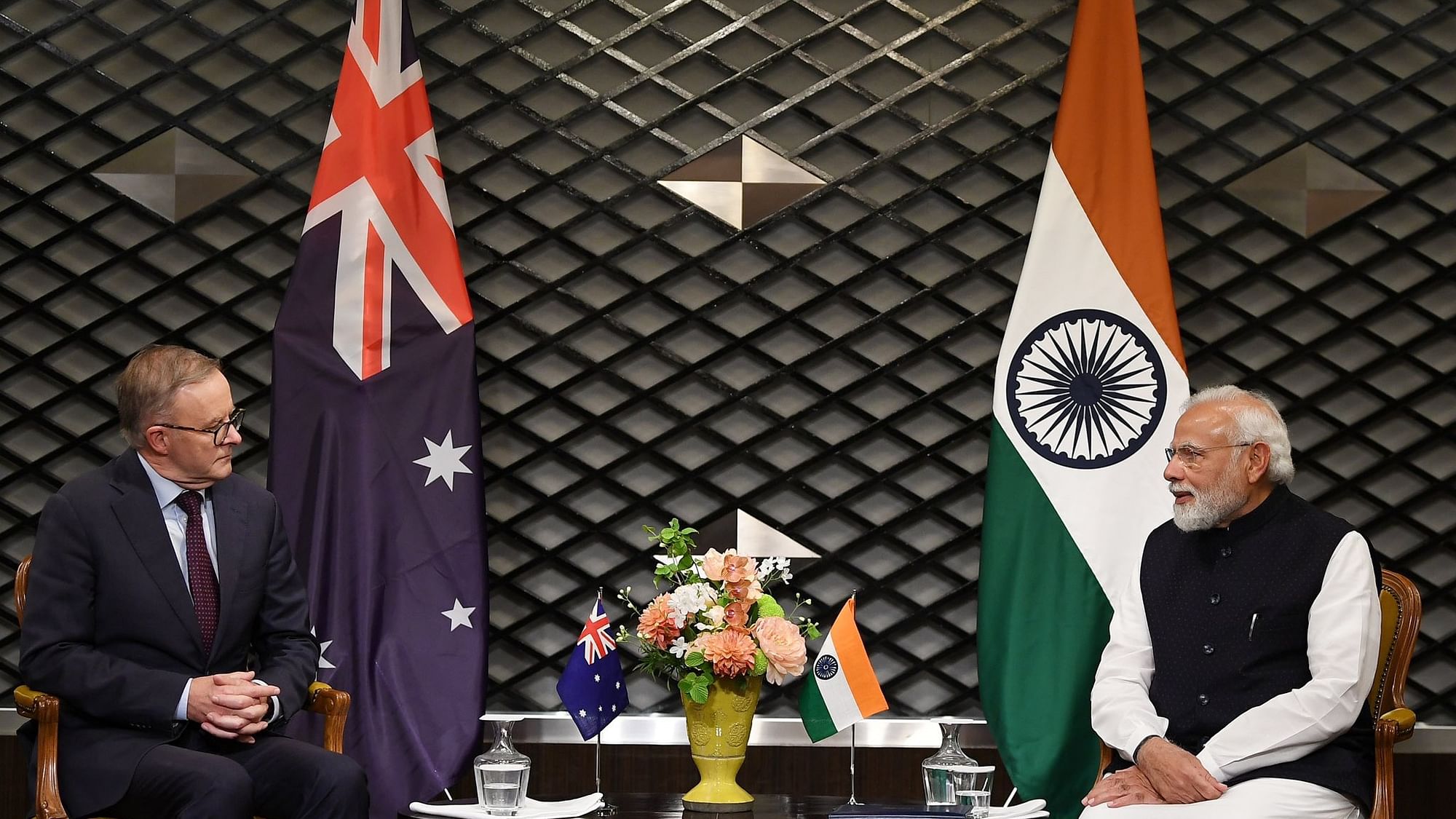


Indian Prime Minister Narendra Modi and Australian Prime Minister Anthony Albanese held a telephonic conversation on Monday, during which they discussed the progress made in bilateral relations and cooperation between the two nations. The 10th round of India-Australia CECA Negotiations was recently held in Sydney, focusing on areas such as Goods, Services, Digital Trade, and Agri tech. Both sides made efforts to understand and address each other's proposals in order to reach a balanced outcome.
India-Australia Relations: A Flourishing Partnership
The relationship between India and Australia has witnessed remarkable growth over the past few decades, underpinned by shared values, strategic interests, and multifaceted cooperation. The recent telephonic conversation between Prime Minister Narendra Modi and Australian Prime Minister Anthony Albanese on Monday further solidifies this strong bond.
Background
India and Australia established diplomatic relations in 1949. However, it was not until the 1990s that the relationship began to evolve into a strategic partnership. The signing of the Joint Declaration on Security Cooperation in 2009 elevated the relationship to a new level, followed by the formation of the Strategic Partnership in 2020.
Recent Developments
Prime Minister Modi and Prime Minister Albanese's telephonic conversation on Monday centered around the progress made in bilateral relations and cooperation. They discussed the recent 10th round of India-Australia Comprehensive Economic Cooperation Agreement (CECA) Negotiations, which focused on areas such as trade, services, digital trade, and agriculture technology.
Top 5 FAQs
1. What is the significance of the India-Australia CECA Negotiations? The CECA Negotiations aim to deepen economic ties between India and Australia by reducing trade barriers and promoting cooperation in various sectors.
2. What is the current status of India-Australia relations? India and Australia have a close and cooperative relationship, collaborating in areas such as defense, trade, education, and cultural exchange.
3. What are some past events that have shaped the India-Australia relationship?
4. What are some of the challenges facing the India-Australia relationship?
5. What does the future hold for India-Australia relations? Both countries are committed to strengthening their partnership, exploring new areas of cooperation, and contributing to regional stability and prosperity.
Conclusion
The telephonic conversation between Prime Minister Modi and Prime Minister Albanese is a testament to the strong foundations of the India-Australia relationship. The ongoing CECA Negotiations and the discussions on bilateral cooperation highlight the mutual commitment to deepen ties and work together on issues of common interest. As both countries continue to navigate the complexities of the 21st century, their partnership is expected to play a vital role in shaping the future of the Indo-Pacific region and beyond.

Russian President Vladimir Putin visits India for a 27-hour trip to meet Prime Minister Narendra Modi and discuss a wide range of topics. The two leaders had a private dinner where they set the tone for the official summit talks the following day. During the talks, PM Modi announced a 2030 Economic Cooperation Programme and discussed economic and energy cooperation with Putin. Additionally, they also emphasized the need to jointly combat terrorism and find a peaceful resolution to the conflict in Ukraine.

In a shocking development, it has been discovered that the bodies of several victims repatriated to the UK following the Air India crash in Ahmedabad were found to contain dangerous levels of formalin, carbon monoxide, and cyanide. This was revealed by Professor Fiona Wilcox, who is leading the investigation into the deaths of 53 British nationals in the crash. The report highlights the lack of awareness about the dangers of formalin exposure in morgues across the UK, putting mortuary staff at risk. Immediate measures have been taken to mitigate the danger, but the report raises concerns about the handling of bodies in such facilities.

Russian President Vladimir Putin and Indian Prime Minister Narendra Modi met in India for discussions on strengthening their countries' strategic partnership. This meeting comes at a time when Russia and India are facing increasing pressure from the United States, with the US imposing tariffs on Indian purchases of Russian oil and Russia's ongoing conflict with Ukraine. Despite these challenges, Modi and Putin have maintained a strong personal relationship and are seeking to deepen their cooperation.

Russian President Vladimir Putin's visit to India has garnered significant attention as it takes place amidst strained relations between India and the US. His 27-hour visit included a ceremonial welcome at the Rashtrapati Bhavan, laying a wreath at Rajghat and taking part in a dinner with PM Modi. The highlight of the visit was PM Modi's gift of a copy of the Bhagavad Gita in Russian, emphasising the cultural and philosophical bonds between the two countries.

The Pakistani government has come under heavy criticism after images claiming that their relief aid to Sri Lanka contained expired products went viral on social media. The supplies, intended for families affected by Cyclone Ditwah, were sent as emergency assistance but were found to have an expiry date of October 2024 printed on the packaging. This discovery has sparked outrage and disbelief, with netizens slamming the Pakistani authorities for their insensitivity and lack of attention to detail.

Thousands of passengers, including Tamilians and other Indian nationals, have been trapped at the Bandaranaike International Airport in Colombo for the past few days due to the devastation caused by Cyclone Ditwah. The Indian High Commission has reaffirmed its commitment to helping its neighbor by delivering urgent humanitarian aid and disaster relief through Operation Sagar Bandhu. Along with providing relief materials, the Indian government is also coordinating with the Sri Lankan government to facilitate the safe return of stranded passengers. Meanwhile, Prime Minister Narendra Modi has expressed sorrow over the loss of lives in Sri Lanka and has promised immediate support from India.

Amidst a fragile ceasefire, Israel carried out a targeted airstrike in the Lebanese capital of Beirut, killing five people and injuring dozens more. The strike was ordered by Israeli Prime Minister Benjamin Netanyahu and has drawn criticism from both the Hezbollah and the Lebanese President. This attack marks a significant escalation in tensions between Israel and Hezbollah, who have been in a state of war for almost two years.

Rajnath Singh spoke at a public event where he reinstated the key role that cultural bonds play in India's global hegemony and asserted Sindh's continued significance to Indian heritage Seeing the ever stronger connection between Sindh and India that has recently seen acknowledgement from the people of Pakistan-occupied Kashmir themselves, in the coming years boundaries could realign providing a pathway for Sindh to once again be a part of India.

Indian Prime Minister Narendra Modi arrived in Johannesburg for the G20 Leaders’ Summit in South Africa, where he will engage in bilateral meetings and participate in the IBSA Summit. This marks the first time the G20 is being held in Africa, with the focus being on building solidarity, equality, and sustainability. PM Modi also expressed his excitement to meet with the Indian diaspora in South Africa, highlighting their strong presence in the country. He will present India's perspective on global issues, emphasizing the country's vision of 'Vasudhaiva Kutumbakam' (the world is one family).

As India commemorates its Independence Day in 2025, it's important to share the spirit and pride of this special day with the world. From inspiring morning messages to beautiful patriotic images, this collection offers the perfect words and visuals to show your love for India. Whether it's through WhatsApp, Instagram, or other social media platforms, spread the joy and gratitude for your country on this momentous day.